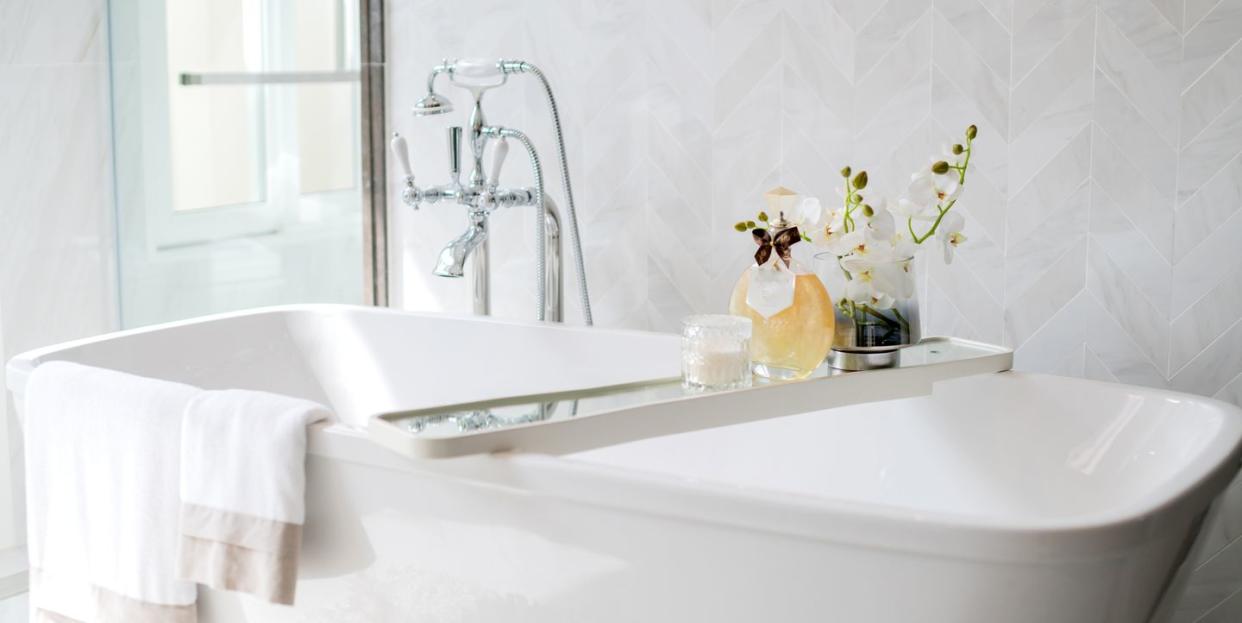These Essential Oils Will Help You Reach Peak Bliss in the Bath

When you need to find your center, there's nothing quite like a bubble bath. And, as it turns out, the right products can even give that warm, comforting water restorative and healing properties.
Similar to the way essential oils help reduce stress and improve seasonal allergies, a few drops of these elixirs in the tub can purportedly do everything from soothe sore muscles to clear up a cold.
Of course, if symptoms are severe, you should check in with your doctor. But, if you're just looking for a little bit of relief, essential oils are a natural and safe tool for your health kit.
But which essential oils are best for the bath? We broke it down.
For relaxation, try...
Lavender essential oil helps improve circulation (great for sore muscles) and has a calming effect, says Martha Krejci, an essential oils expert. Use this essential oil at the end of a long, busy day for a super relaxing experience that'll prime you for sleep.
For pain relief, try...
Copaiba is an oil distilled from a tree indigenous to South America. "It's fabulous for overall skin health and has a nice grounding fragrance that really calms the mind," says Krejci. Studies suggest it may also have anti-inflammatory, anti-microbial properties, and can even relieve pain in those with arthritis.
For sore muscles, try...
Frankincense has a woody aroma that many swear by for relaxation, namely because of its reported anti-inflammatory properties. In fact, Krejci calls it a "superstar" for this, plus its ability to keep skin soft and supple.
For a cold or dry skin, try...
If you have a cold, or are feeling sick, diffuse some eucalyptus for your bath water. This oil is considered an expectorant, or something that loosens mucus, says Dr. Scott Noorda, a board-certified family physician. Studies suggest it also boosts ceramides, helping to hydrate dry skin and soothe itchiness and discomfort associated with mild irritations.
We've rounded up a few to try:
Wait, what about peppermint?
Peppermint is typically considered a "warm" oil, which means it can irritate those with sensitive skin. Experts, and even brands like doTERRA, caution against using these types of oils in the bath.
You should also avoid "hot" oils.
“Hot” oils, like cinnamon, oregano, and thyme may also cause irritation, says Dr. Gretchen Frieling, a board-certified dermatologist in Boston. Most citrus oils have the potential to burn the skin when added to a bath, too, she says.
If you're unsure, test a drop of oil on the back of your hand and watch for any reactions. If you feel any burning sensation, it’s best to keep it out of the tub completely, says Frieling.
And if you have especially sensitive skin, approach with even greater caution. Dr. Sonia Batra, a board-certified dermatologist and co-host of The Doctors, recommends that you patch test with any oil once a day for five days on the inner arm to check for allergic reaction before soaking in it.
Don't forget to dilute, either.
Avoid dripping essential oils right into the bath, since this can cause oils to sit on top of the water, allowing them to come into direct contact with skin, causing irritation and even burns, says Krejci.
The best way to dilute oils is to mix them with a carrier oil, like jojoba or fractionated coconut oil. To do this, combine one tablespoon of your choice of carrier oil with six to 10 drops of essential oil in a small bowl. Once you've done that, it's safe to pour the mixture into the bath water, swirling to combine.
And last, but certainly not least, watch your step.
Since oil is inherently slippery (and so is your bathtub), be sure to exercise caution when getting in and out of your tub—especially if your bath caddy had a big glass of wine on it.

